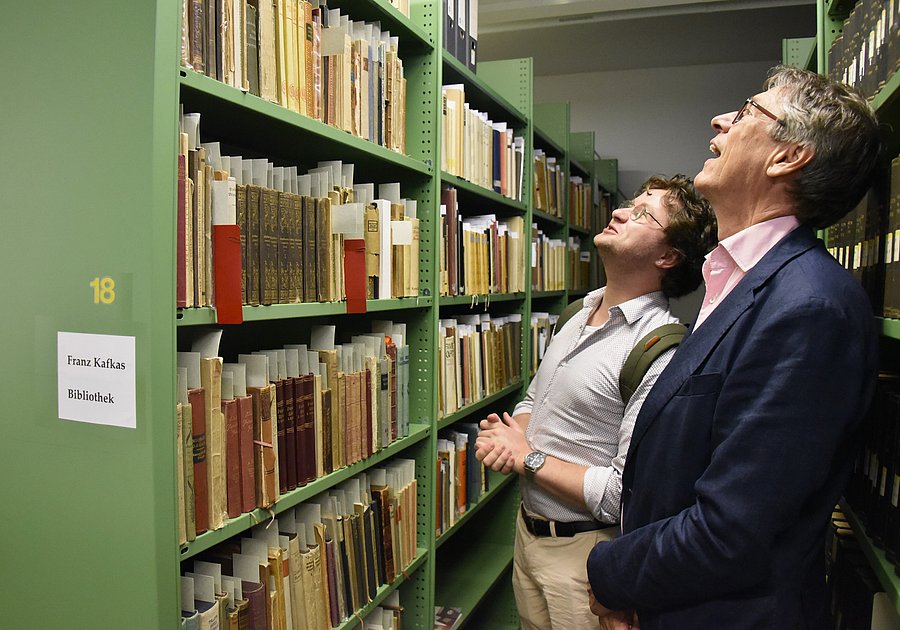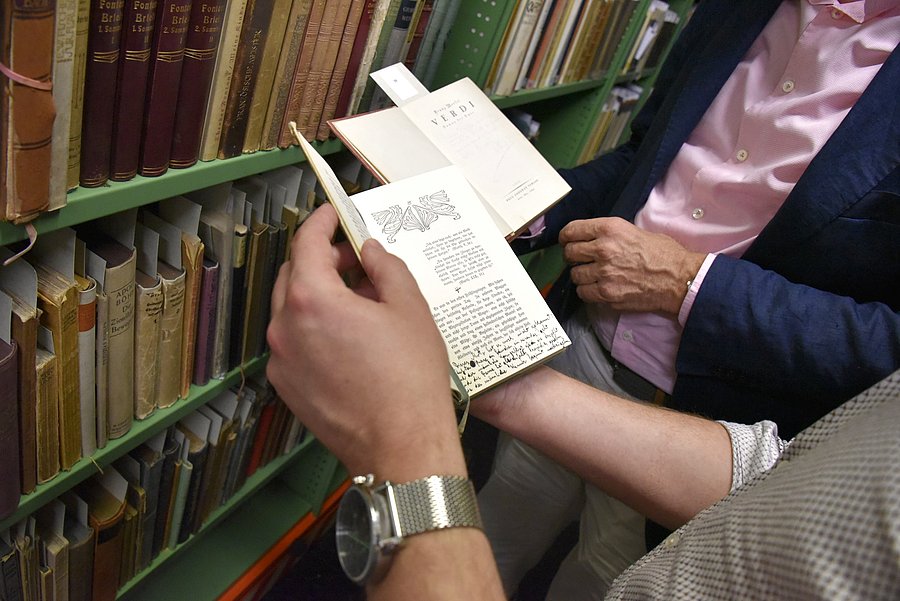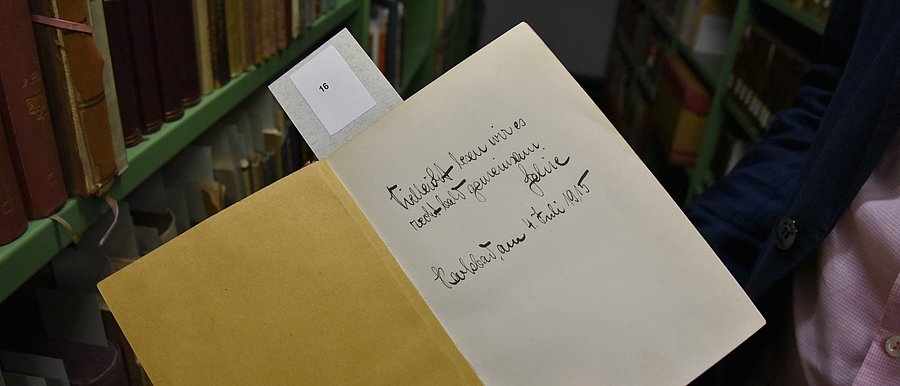With concert and reading
Wuppertal doctoral student organises Kafka conference in Prague

Kafka still invites research and amazement today: PhD student Jan David Schenk (left) and literary scholar Prof Dr Michael Scheffel // Photos (3) Marylen Reschop
The German-language conference "Kafka's Diagnostics of Modernity" is offering a varied programme from 16 to 18 October: In addition to a dozen lectures, there will also be a reading and a concert.
- Registration for the anniversary conference with free admission are still possible and are requested by the organisation team at: schenk[at]uni-wuppertal.de.
Kafka is so important for philosophy because his works deal with themes that address the fundamental questions of human existence, the search for meaning and the confrontation with an incomprehensible world. To this day, his legacy is a projection screen for the thoughts of generations, communities and groups. "Various philosophical positions from the 20th century onwards also gain their profile from the different ways in which they interpret Kafka," explains Jan David Schenk. In his research, the Wuppertal doctoral student is investigating the question of which basic assumptions underlie the various interpretations and critically examining them against the background of Kafka's work. In doing so, he is pursuing the idea of highlighting the fault lines between the positions: What does it mean to be human in the modern age? What answers does Kafka give? And what basic patterns characterise his readings?
Many points of contact
In Prague, he wants to discuss these and other questions with as many people as possible, bringing together young academics with established Kafka researchers - from the fields of philosophy and literary studies. "When analysing Kafka's work, the boundaries between literary studies and philosophy become blurred. It is therefore predestined to bring the two disciplines into dialogue with each other. Looking beyond disciplinary boundaries challenges us to think further and sometimes differently. That's what makes it so exciting," says Schenk. Based on his research, he himself is making a contribution to the critical history of reception. "The trench warfare, both latent and played out in the recent history of philosophy, can be reconstructed in the way Kafka is dealt with. I want to understand and analyse them. From my perspective, this cannot be done in isolation from the historical circumstances: What people take from Kafka's works, what they process from them and how, always has something to do with what they considered worthy of thought and hope, in which time they themselves lived and live," summarises Schenk.

On the trail of the past: the BUW University Library houses volumes from Kafka's private library (see info box). Some of them are labelled with dedications to the Prague writer and notes by him.
Words of recognition
"This conference is something special in two respects," explains literary scholar Michael Scheffel. The Wuppertal professor, now retired, has supported the work on the Prague conference and will be there himself as a speaker in October. Such conferences are rarely organised by doctoral students. "It's great to see Jan David Schenk using the contacts he made during his semester abroad in Prague to organise an academic, German-language conference in Kafka's birthplace and hometown," says Scheffel appreciatively. A Kafka conference in Prague also still has a special historical background. "After the Second World War, Kafka was nowhere near as popular in the former communist states of Eastern Europe as we know him from a Western perspective; he was even banned for a long time," says Scheffel.
In his lecture, the literary scholar will focus on the socio-historical context of Kafka and the author in his role as an outsider. Scheffel: "As in Kafka's lifetime, we are once again seeing a tendency towards the nationalisation and homogenisation of societies. One of the questions that arises again in this context is: Where does the group of Jews belong in such times?" According to the approach, Kafka's view of current affairs at the time as an author and observer - who was Jewish himself and is described as particularly sensitive and thoughtful as well as observant - provides valuable insights for the current discourse on social relations and our coexistence.
3 June 2024 marked the 100th anniversary of Kafka's death. To mark this anniversary, events are being organised throughout the year that focus on Franz Kafka, his life, work and achievements.
Date
16 to 18 October 2024: "Kafka's Diagnostics of Modernity." Conference Centre of the Institute of Philosophy of the Czech Academy of Sciences, Husova 4, Prague 1, Czech Republic. Further information on the festival website "Kafka 2024".
Background
Jan David Schenk's Master's degree at the University of Wuppertal took him to Prague for a semester. It was here that he met Markus Hodec, co-organiser of the anniversary conference in 2019, who was doing his doctorate at Charles University in Prague at the time. Together, they are organising the conference as a cooperation between the University of Wuppertal and the Czech Academy of Sciences.

Fascinating insights into Kafka's private library.
Not by chance: Kafka and the University of Wuppertal
Since 1982, the Wuppertal University Library has housed the surviving volumes from Kafka's private library. Among them are numerous works with dedications to Kafka as the recipient of the books, as well as one or two of his own reading notes.
The fact that the book collection is here is thanks to Jürgen Born. The academic, who died at the beginning of 2023, had been shaping German Kafka research since the 1960s and came to the then Gesamthochschule Wuppertal, now the University of Wuppertal, as a professor in 1974. In this role, he founded the Research Centre for Prague German Literature, reconstructed Kafka's library before succeeding in bringing the collection to the university, and initiated work on the Historical-Critical Edition of Franz Kafka's writings.
Initially, this meant locating, collecting and documenting Kafka's manuscripts, which were scattered all over the world - and still are today - and tracing their genesis. In other words, to assign the manuscripts to different works according to their genesis in order to correct and comment on the form of the texts published by Kafka's friend and estate administrator Max Brod - for example, the novels, some of which Kafka never completed. The result is an internationally acclaimed edition whose editorial threads came together in Wuppertal, later primarily under the direction of Hans-Gerd Koch.
